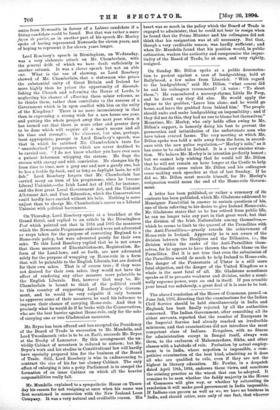Lord Rosebery's speech in Birmingham, on Wednesday, was a very
elaborate attack on Mr. Chamberlain, with the general drift of which we have dealt sufficiently in another column. It was a clever speech but not an able one. What is the use of showing, as Lord Rosebery showed of Mr. Chamberlain, that a statesman who prizes the substantial unity of Great Britain and Ireland far more highly than he prizes the opportunity of disestab- lishing the Church and reforming the House of Lords, is neglecting his chance of effecting these minor reforms, as he thinks them, rather than contribute to the success of a Government which is in open conflict with him on the unity of the Kingdom ? There is no more inconsistency in that than in expressing a strong wish for a new house one year, and putting the whole project away the next year when it has turned out that there is some other and greater duty to be done which will require all a man's means and all his time and strengtb. The cleverest, hut also, perhaps, least appropriate, passage in Lord Rosebery's speech, was that in which he satirised Mr. Chamberlain's taste for s. unauthorised" programmes which are never destined to be carried out "I do not know whether you have ever seen a patient fisherman whipping the stream. He flogs the stream with energy and with conviction. He changes his fly from time to time, now a grey one and now a gaudy one, but he has a fertile fly-book, and as long as daylight lasts, he will fish." Lord Rosebery forgets that Mr. Chamberlain has carried many an item of his programme, since he became Liberal Unionist,—the Irish Land Act of 1887, for instance, and the first great Local Government Act, and the Unionist Allotment Act, and Free Education, which the Conservatives could hardly have carried without his help. Nothing is more unjust than to charge Mr. Chamberlain's career as a Liberal Unionist with political barrenness.


































 Previous page
Previous page